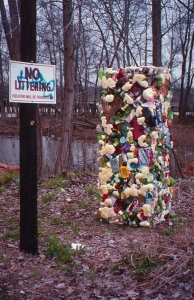March 28-June 26 – Sustain Me Baby: art exhibit at Projective Eye Gallery, UNC Charlotte Center City.
March 28-June 26 – Is This Yours?: art installations, calling attention to plastics waste, to be placed around Charlotte, from local artists Kurt Warnke and Nancy Pierce.
May 9-July 26 – Stayin’ Alive: – art exhibit. Work by Aurora Robson at McColl Center for Visual Art.
May 16 and June 13 – Clean Martini Screens – Join us for for film screenings, discussion, and clean martinis made by local distilleries from local products, as well as light locally sourced hors d’oeuvres.
June 13, 6-9 PM Growing Cities and short clips from Jean Paul Ganem. Followed by a panel discussion on urban agriculture and food-waste recycling. Mary Newsom of the UNC Charlotte Urban Institute will moderate the discussion. Panelists will be:
Henry Owen, program director for Friendship Gardens.
Kris Steele, board member of Keep Mecklenburg Beautiful and a Wilmore neighborhood activist
Nicole Peterson, UNC Charlotte assistant professor of anthropology, and an affiliated researcher at the Center for Research on Environmental Decisions at Columbia University, and a leader in the creation of the Integrated Network for Social Sustainability.
May 16, 6-9PM – Bag it: Is your life too plastic?: Mary Newsom of the UNC Charlotte Urban Institute and PlanCharlotte.org moderated the panel discussion. The event is co-sponsored with Slow Food Charlotte and will feature “clean martinis” made from local products at local distilleries, as well as light, locally sourced hors d’oeuvres.Panelists:
Mike Lizotte, the UNC Charlotte sustainability officer.
Laurette Hall, Mecklenburg County Solid Waste, environmental manager of waste reduction programs.
Meg Fencil of Sustain Charlotte, a local sustainability education and advocacy group that studied Mecklenburg’s recycling rate, comparing it with other cities.
Sam Perkins, of the Catawba Riverkeeper Foundation, who will discuss the problem of trash, especially plastics, and how they affect our waterways.

